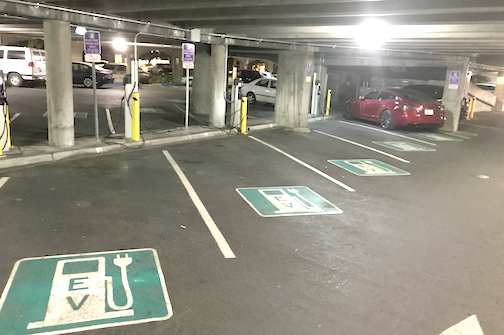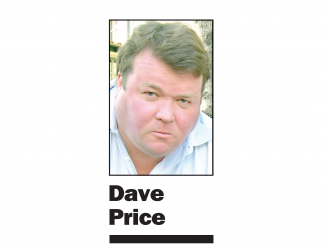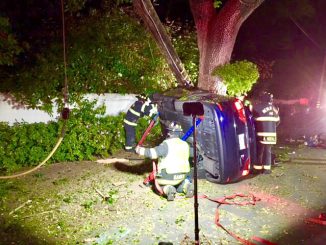
OPINION
BY DAVE PRICE
Daily Post Editor
I’ll admit that I don’t understand this. When the automobile first became popular in the early 1900s, it wasn’t necessary for the government to build gas stations to fuel cars. Private industry took care of that, and soon every town had one or more service stations. Selling gasoline and providing auto services became a highly competitive and profitable industry.
So I don’t understand why Gov. Gavin Newsom has proposed spending $1 billion to pay for electric vehicle charging stations. And I don’t get why President Biden’s $2.3 trillion infrastructure bill calls for installing 500,000 charging stations at taxpayer expense.
A guy who makes $40,000 a year will likely ask himself, why are my taxes going to pay for a charging station that helps a guy who can afford an $80,000 car?
If electric vehicles are so great, why aren’t private entrepreneurs opening EV charging stations on their own instead of the government? Why aren’t builders automatically including them in new homes?
If there is consumer demand for EVs charging stations, then there will be people who want to fill that demand.
(Yes, there are some privately funded EV stations, but the numbers are not on the scale that the federal or state governments are planning. If entrepreneurs can do this, why is the government involved at all?)
Election proposed
 While I’m on this topic, Menlo Park Mayor Drew Combs and Councilman Ray Mueller should be commended for calling for a citywide election on that city’s Climate Action Plan. Unfortunately they were outvoted.
While I’m on this topic, Menlo Park Mayor Drew Combs and Councilman Ray Mueller should be commended for calling for a citywide election on that city’s Climate Action Plan. Unfortunately they were outvoted.
The city has already banned gas water heaters, clothes dryers and space heaters in new buildings. Now the plan’s goal is to reduce greenhouse emissions by 90% by 2030 in part by making homes and businesses all-electric.
Given PG&E’s history of blackouts and rising electric rates, people are leery of pulling the plug on gas. At least if you have a gas hook-up, you can take a warm shower, heat your home or prepare a meal on the stove when the electricity goes out.
‘Brink of disaster’
The city’s plan includes this quote: “Just as the U.S. government stepped in forcefully after the bombing of Pearl Harbor to require that much of America’s free market economy be transformed to support the war effort, so too must the government now step in forcefully and confidently to lead the American public away from the brink of climate disaster.”
Instead of force, let people decide for themselves whether we’re on the brink of disaster, and if so, how they should address it.
Let each resident weigh the pros and cons and decide whether to forego natural gas.
For many residents, it costs less to use gas, and that’s an important consideration. If you’re concerned about the environment, natural gas is one of the cleanest of fossil fuels. And it’s reliable — it doesn’t stop flowing when the sun goes down or when an unexpected ice storm freezes wind turbines.
Why not a debate?
If the city really wanted to accomplish something, it should sponsor a series of debates on natural gas. The city could hold the debates in the council chamber, which has TV cameras, and send out the video on the Midpen Media Center cable access station as well as stream it. Invite each side to bring in a team of three debaters. Have a moderator to hold the two sides to strict time limits.
Let the residents use the debates to help them decide whether to give up gas.
But for each resident, the decision should be voluntary.
Now is the wrong time to talk about new laws to restrict people’s lives. We’re just coming out of an unprecedented, year-long lockdown that kept people in their homes, destroying businesses and jobs. Maybe California overreached, given the fact that other states (Florida, for example) had about the same per-capita death toll with fewer restrictions?
Whatever your views of the lockdown, government should give people a break and avoid imposing new restrictions on how we live our lives.
Editor Dave Price’s column appears on Mondays. His email address is price@padailypost.com.




Thanks for saying this. Our democratic republic is becoming more like an authoritarian dictatorship every day.
I think you’ve forgotten but we subsidized cars with the interstate highway system.
with businesses struggling and people looking for work … and housing still hard to find … why is counsel worried about natural gas? seems this should be much lower on the counsel’s priority list, like NO. 5000.
Don’t forget the guy making $40,000 a year, driving a Toyota Corolla, who can’t purchase an electric vehicle like a Tesla on that salary, is not only paying for the installation of government subsidized public recharging facilities, he’s also footing the bill for California electric car rebates. New electric cars which in some cases cost $40,000-120,000 for some current Tesla model vehicles.
According to Hearst Autos Research: Since 2010, California has handed out $809 million of taxpayer money to put 354,000 battery-electric, plug-in hybrid, and hydrogen fuel-cell cars on public roads. Roads which some of us pay for though state gasoline tax,….at least those who still own and operate gasoline-powered vehicles.
In other words, folks making a $40,000 @ year salary are subsidizing Tesla owners who make 6 figures.
Some can accurately claim this is a stark example of subsidizing the well-healed in California at the expense of those who are barely getting by and scratching out a living.